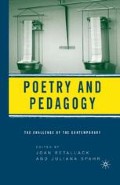Abstract
To teach is to create new interlocutors: within the academy at the graduate level, since at least in theory many of our students are training for an academic life; and outside the academy at the undergraduate level, since, at least in the public land-grant institution I’m in, our students are mainly bound for “secular” lives. If they can carry into those bare survivalist lives a kinetic memory of exultation occasioned by the poetic and by exercising their own apperceptive faculties at large, and if they can find resonant experiences in their intimate, public or professional lives, the revolution in poetic language can claim another victory by stealth, however subtle, diffuse, or invisible to the instrumentalist eye. Guy Debord’s dictum “We have to multiply poetic subjects and objects” provides an incisive mandate for the poetry/pedagogy enterprise.4
Yes, pappy, i went to kollage, but what the Hell has that to do with poetry?
—Stephen Jonas, “Letter to Cid Corman”1
Should I sing a requiem as the trap closes?
Perhaps it is more fitting to shout nonsense.
—Bob Kaufman, “Perhaps”2
Jokingly invoking the death of Jimi Hendrix
I find myself vomiting all over my copy
of the Princeton Encyclopedia of Poetry and Poetics.
—Ed Morales, “The Last Hispanic”3
Access this chapter
Tax calculation will be finalised at checkout
Purchases are for personal use only
Preview
Unable to display preview. Download preview PDF.
Notes
Stephen Jonas, “Letter to Cid Corman,” that: 23 (July 1994), 1.
Bob Kaufman, “Perhaps,” Solitudes Crowded with Loneliness (New York: New Directions, 1965), 54.
Ed Morales, “The Last Hispanic,” Aloud: Voices from the Nuyorican Poets’ Cafe (New York: Henry Holt, 1992), 99.
See Stanley Aronowitz, “Is Democracy Possible?,” The Phantom Public Sphere (Minneapolis: Minnesota University Press, 1993), 75–92.
Rachel Buff, Immigration and the Political Economy of Home: West Indian Brooklyn and American Indian Minneapolis (Berkeley: California University Press, 2001).
Jack Spicer, The Collected Books of Jack Spicer (Santa Rosa, CA: Black Sparrow Press, 1975), 147.
Mary Caroline Richards, Centering in Pottery, Poetry and the Person (Middletown, CT: Wesleyan University Press, 1989), 15.
John Beverley, Against Literature (Minneapolis, MN: Minnesota University Press, 1993).
Henry Louis Gates, Jr., The Signifying Monkey: A Theory of African-American Literary Criticism (London: Oxford University Press, 1990).
Steven Caton, “Peaks of Yemen I Summon”: Poetry as Cultural Practice in a North Yemeni Tribe (Berkeley: California University Press, 1990);
Lila Abu-Lughod, Veiled Sentiments: Poetry and Honor in a Bedouin Society (Berkeley: California University Press, 1986);
Barrett Watten, “The Bride of the Assembly Line,” Impercipient Lecture Series (Providence, RI, 1997) and other essays to be found in Poetics Journal and Qui Parle;
Charles Bernstein, A Poetics (Cambridge, MA: Harvard University Press, 1992) and My Way (Chicago: Chicago University Press, 1999).
Jorie Graham, “Interview,” A View from the Loft 17:4 (1994), 6.
See especially Beatty, Big Bank Take Little Bank (New York: Nuyorican Poets’ Café Press, 1990).
Amiri Baraka, “SOS,” Transbluesency (New York: Marsilio, 1999).
Tricia Rose, Black Noise: Rap Music and Black Culture in Contemporary America, (Hanover, NH: Wesleyan University Press, 1994).
George Lipsitz, “Learning to Listen, Listening to Learn,” American Studies in a Moment of Danger (Minneapolis: Minnesota University Press, 2001), x.
Duke Ellington, “Categories,” Music Is My Mistress (New York: Da Capo, 1973), 38.
Timothy Brennan, “Off the Gangsta Tip: A Rap Appreciation, or Forgetting about Los Angeles,” Critical Inquiry 20 (Summer 1994), 663–693.
Mark Slobin, Subcultural Sounds: Micromusics of the West (Hanover, NH: Wesleyan University Press, 1993).
George Lipsitz, “Popular Culture: This Ain’t No Sideshow,” Time Passages: Collective Memory and American Popular Culture (Minneapolis, MN: Minnesota University Press, 1992), 3–20.
Bob Perelman, “Write the Power,” American Literature 65:1 (1994), 315.
Nancy Fraser, “Rethinking the Public Sphere: A Contribution to the Critique of Actually Existing Democracy,” The Phantom Public Sphere (Minneapolis: Minnesota University Press, 1993), 1–32.
Editor information
Copyright information
© 2006 Joan Retallack and Juliana Spahr
About this chapter
Cite this chapter
Damon, M. (2006). Post-Literary Poetry, Counterperformance, and Micropoetries. In: Retallack, J., Spahr, J. (eds) Poetry & Pedagogy. Palgrave Macmillan, New York. https://doi.org/10.1007/978-1-137-11449-5_8
Download citation
DOI: https://doi.org/10.1007/978-1-137-11449-5_8
Publisher Name: Palgrave Macmillan, New York
Print ISBN: 978-1-349-73492-4
Online ISBN: 978-1-137-11449-5
eBook Packages: Palgrave Social & Cultural Studies CollectionSocial Sciences (R0)

